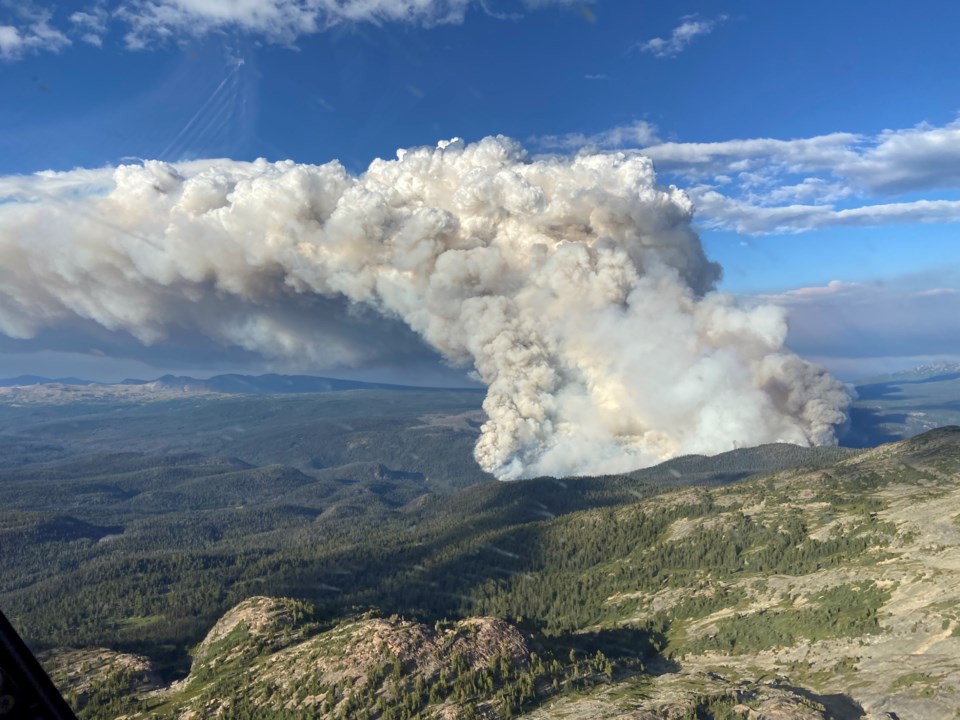The 2023 wildfire season in British Columbia has overtaken all others to become the worst on record, according to data from the BC Wildfire Service.
By July 17, at least 13,922 square kilometres had burned across the province, equivalent to burning 45 per cent of Vancouver Island. That outstrips 2018, which previously held the rank as worst wildfire season in the province's history.
The four worst seasons in B.C.'s history have all come in the last six years. Experts say it's a sign of the hot and dry conditions associated with a changing climate.
“Extreme fire weather is driving our current situation,” said Mike Flannigan, a professor at Thompson Rivers University in Kamloops researching fire weather and climate change.
“This is going to continue for some time.”
B.C. has now joined several other provinces this year to record their worst fire season on record. On Monday, Canada, which has already broke its own record, burned past the grim tally of more than 100 million hectares burned — an area larger than South Korea.
Over the weekend, a wildland firefighter died near Revelstoke, B.C., when a tree fell on her, and on Monday, the BC Coroners Service confirmed it was investigating the death of nine-year-old Carter Vigh, who is said to have died after wildfire smoke triggered a deadly asthma attack near his home in 100 Mile House.
In a release, the province warned people to heed air quality advisories.
“Smoke from wildfires is especially dangerous for people with pre-existing heart and lung conditions, older people, and infants and young children,” said the government in a press release.
It called on residents to seek an indoor space or a vehicle with closed windows and air conditioning.
Those without access to such spaces can purchase high-quality HEPA filters to clean an individual room of a house, or visit places with a controlled air supply like libraries, swimming pools or shopping malls.
Efforts to fight wildfires across the province remain challenging. On Monday, the Canadian Armed Forces says the first troops to help in British Columbia's wildfire fight have arrived in the province, with more soldiers, helicopters and a Hercules plane poised for deployment.
"We also know we can count on the Canadian Armed Forces to be able to assist in terms of a lot of the work that needs to be done," said B.C. Public Safety Minister Mike Farnworth on Monday.
"While they don't necessarily fight the fires on the front lines, they can provide important work to be able to allow the firefighters to do the work they need to be doing on the ground."
Their arrival comes following a burst of weekend lightning strikes, said Flannigan, who has been monitoring fire activity using satellite imaging technology for years.
“There’s been tonnes of lightning,” he said.
If there weren’t enough superlatives to describe Canada’s wildfire season, there have been at least 90 pyrocummulus thunderstorms, known as pyro-Cbs, across Canada this season, according to the U.S. Naval Research Laboratory, which keeps a record. Pyro-Cbs form when a wildfire generates its own weather, triggering more lightning and creating a vicious circle of fire.
“The previous record was 102 for the entire globe,” Flannigan said.
The fire expert added that this season has been unusual in yet another way — more wildfires are burning at night, removing the only respite firefighters can hope for at this time of year when rain is scarce.
“At least that gives you a break. Now, with this hotter, drier world, more and more times, we're seeing fires burn through the night intensely,” he said.
With files from the Canadian Press





